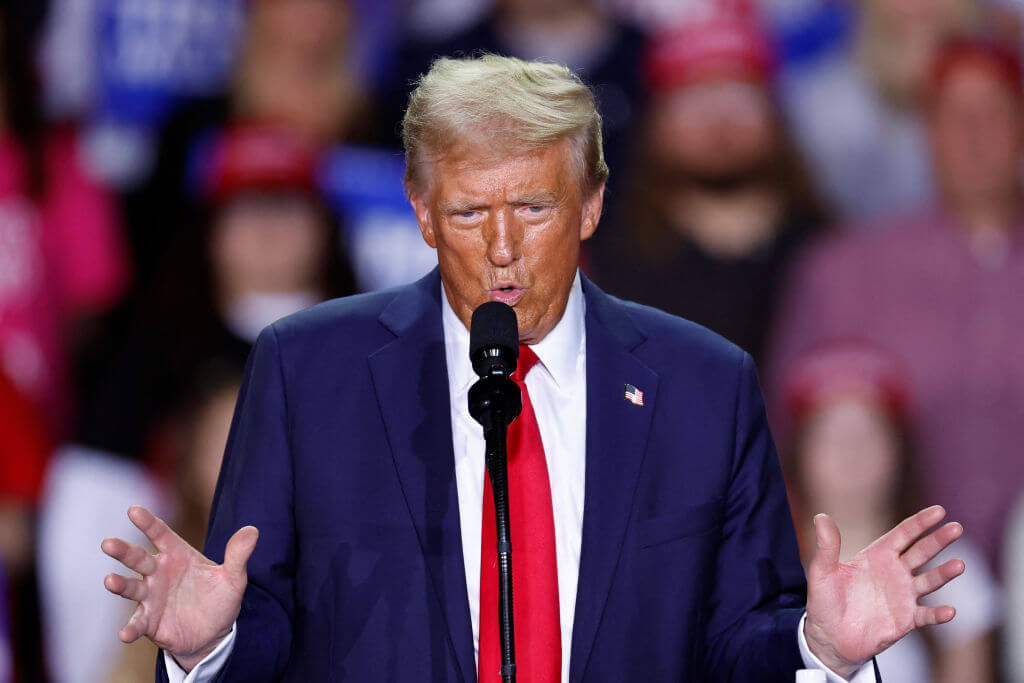Arab Americans and Israel hawks battle for influence in Trump’s second term
Massad Boulos, the Lebanese-American father-in-law of Tiffany Trump, may play a role in mediating a ceasefire in Lebanon

Former President Donald Trump in Grand Rapids, Michigan on Nov. 5, 2024. Photo by KAMIL KRZACZYNSKI/AFP via Getty Images
As President-elect Donald Trump huddles with his transition team to shape his new cabinet, several influential figures who played a key role in his campaign’s outreach to Arab American voters in Michigan are pushing for him to adopt a more favorable stance toward Palestinians in a post-war effort for regional peace.
In an interview with Israel’s Channel 12 on Saturday, Bishara Bahbah, chair of the Arab Americans for Trump group, claimed that Trump had promised to support a peace settlement based on the two-state solution. “He is a man of his word,” Bahbah said.
The New York Times reported on Sunday that Massad Boulos, the Lebanese-American father-in-law of Tiffany Trump and a key emissary to Arab American voters during the campaign, met with Palestinian Authority President Mahmoud Abbas at the U.N. General Assembly in September to help build warm ties with Trump. Abbas called Trump on Friday to congratulate him on his victory.
Boulos’ name has come up as a possible point person for Lebanon in the incoming administration. “Lebanese Americans are migrating to the Republican party and to Trump,” Boulos said, “because they feel that Trump is their only hope to end this war, and end all the wars.”
This group believes Trump, given his unpredictable and sometimes populist approach to foreign policy, could present a new vision for peace that positions him as an American leader capable of engaging both Israel and Arab nations on more equal terms.
At the same time, Israeli Prime Minister Benjamin Netanyahu is working to strengthen his ties with Trump, aiming to bolster assurances of continued U.S. support for Israeli security and to expand diplomatic ties with Arab nations without engaging in traditional peace process frameworks, which Netanyahu has dismissed as ineffective. In a video on Sunday, Netanyahu said that he has spoken with Trump three times in recent days and is sending his close adviser, Strategic Affairs Minister Ron Dermer, to meet later this week with Trump’s team at Mar-a-Lago.
Jared Kushner, Trump’s son-in-law and former Middle East adviser, who said earlier this year he would not return to the White House, has reportedly re-entered consultations behind the scenes to offer advice on advancing broader regional peace that could also include normalization between Saudi Arabia and Israel. (Kushner’s private equity firm, Affinity Partners, received a $2 billion investment from Saudi Arabia’s sovereign wealth fund.)
Kushner said in April that giving the Palestinians an independent state after Oct. 7 would be “a super bad idea” that “would essentially be rewarding an act of terror.”
Can Trump navigate these competing visions?

While it’s too early to determine Trump’s priorities in a second term, experts on the Middle East and U.S.-Israel relations said that the hopes of shifting Trump away from his strong support for Israel during his first term are both premature and unlikely.
“I wouldn’t reach conclusions based on Trump playing the Mr. Nice Guy that all the flatteries can be reciprocated,” said Aaron David Miller, a senior fellow at the Carnegie Endowment for International Peace and a former peace negotiator.
Danielle Pletka, a senior fellow at the conservative American Enterprise Institute, said it’s foolish to think Trump’s long-standing pro-Israel stance will change. “I don’t see why a man at the age of 78 suddenly decides he’s not pro-Israel,” she said. Pletka added that at the start of any new administration, there are always individuals trying to position themselves for influence, pretending to have access or claiming to understand the leader’s thinking. “But I think Trump has clear principles when it comes to Israel and Iran,” she said.
The ‘no compromise’ pro-Israel faction
During the campaign, Trump leaned on a mix of informal Jewish advisers, who are more hawkish on Israel. Additionally, David Friedman, Trump’s former U.S. Ambassador to Israel who could return in a national security role, suggested in a recent book that the U.S. should divert $1 billion from Palestinian aid to fund West Bank annexation.
Former Rep. Lee Zeldin, a close ally of Trump who has been discussed as a potential candidate for secretary of defense, told the Forward in July that the next administration will find a way to expand the Abraham Accords without needing to solve the Israeli-Palestinian conflict. “You don’t have to accept the premise that the only way in for the Middle East is through the front door,” Zeldin said. “If there’s a back door that is open, President Trump will find it.”
A message from our Publisher & CEO Rachel Fishman Feddersen

I hope you appreciated this article. Before you go, I’d like to ask you to please support the Forward’s award-winning, nonprofit journalism so that we can be prepared for whatever news 2025 brings.
At a time when other newsrooms are closing or cutting back, the Forward has removed its paywall and invested additional resources to report on the ground from Israel and around the U.S. on the impact of the war, rising antisemitism and polarized discourse.
Readers like you make it all possible. Support our work by becoming a Forward Member and connect with our journalism and your community.
— Rachel Fishman Feddersen, Publisher and CEO





























